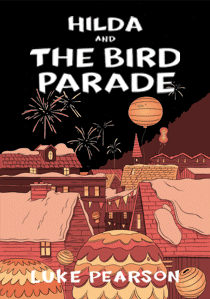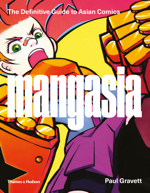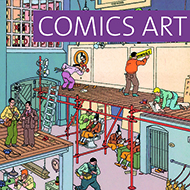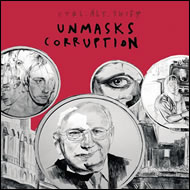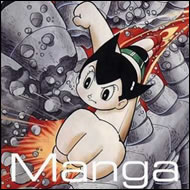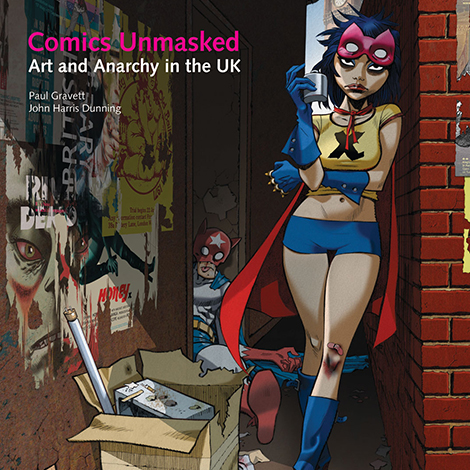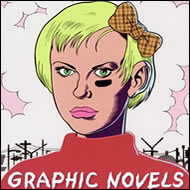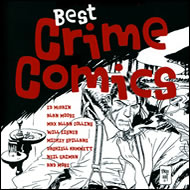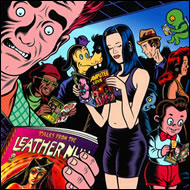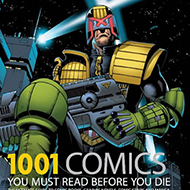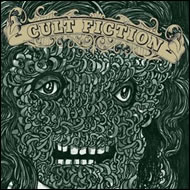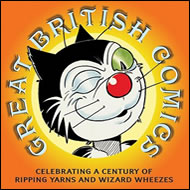Paul Gravett:
The Arena Interview
Leonie Cooper is a freelance journalist who writes on music and lifestyle for the NME, Bust, Bizarre, Guardian and others. She interviewed me at length for a feature on comics and their current massive crossover appeal in Arena, Britain’s orginal style magazine for men. As only a couple of quotes made it into the final feature in the February 2009 issue, she kindly let me run the full interview here.

Arena:
Why do you think that comics/graphic novels are currently experiencing an increase in popularity?
Paul Gravett:
This growing popularity only seems strange and newsworthy to us in the UK because the main publishers here fumbled the ball in the early 1990s and a whole generation got bypassed as they took up computer games and the internet instead of comics. Elsewhere, notably in Japan and France where the local comics culture is massive, their comics markets didn’t go through the same crises and the synergy between comics and all the other media is totally natural and taken for granted.
Among the key factors that are shifting things here in Britain are: the huge rise in manga, translated Japanese comics, grabbing a young market largely uncatered for, especially girls; a generational shift as people who grew up in the 1980s boom of Watchmen, Dark Knight, Maus etc have attained positions of media influence, including film directors and special effects developers; the unleashing of the huge bottled-up talent pool here, whether they are raising their profile working for the almighty dollar or stick with the homegrown scene, or self-publishing their works in print and online; the unstoppable rise of the graphic novel market in bookshops and librairies, breaking out of the niche specialist shops. After a record year in 2007, Nielsen Bookscan reports that 2008 has already seen a 31.6% increase over last year and the number of graphic novels and manga published has gone up by two-thirds to around 2,900 this year.
On top of all that is the internet: as a means to get seen and build and sell direct to an audience, to sample, spread the word and cut out middlemen and censors - and as a way to acclimatise more readers into navigating and decoding the signs and icons and multi-track reading and viewing that comics treat as standard. Comics pre-date movies and invented a great many supposedly "cinematic" techniques years before, but comics experienced a huge surge in popularity from the late 19th century into the early 20th when cinema took off and as the public grew to understand better the two media’s related but distinct frame-to-frame language. Now something similar is happening during this "fin de siècle" transition. Making and reading/viewing comics is closely related to much web-page design, the two media exercising both sides of the brain.
How do you explain the fact that people seem overly keen to comic-ify everything at the moment? First we had Hollywood and its stream of graphic novel/comic adaptations, but now things seem to be happening the other way around… There’s Stan Lee turning Paris Hilton into a comic/cartoon for MTV, and he’s recently said he’d like to do the same for the Beckhams. There’s the comic remake of the cult gang film The Warriors coming out next year. Musicians the Audio Bullys are releasing their next single in comic book form. Stephen King’s The Stand is currently being released as a comic book. Christina Aguilera recently advertised her new album with a comic book style video. Musician Jeffrey Lewis and his illustrative comic books for each song he sings… and the list goes on.
Comics are undeniably cool. They’re a graphic, quirky, distorted funhouse mirror of our lives, dreams and nightmares. They’re so damn hot right now that everybody wants a piece. Comics are also cool - and not just in the sense of ‘hip’ or ‘groovy’ - but that Marshall McLuhan ‘cool’ - he rated them because, unlike our passive intake of TV or films, comics need the reader to warm them up, bring them to life, make them play, like performing sheet music or animating a storyboard. They’re a perfect interactive, interpretive halfway-house between text and movies and they can be made by a crew of one, with pens, pencils and pixels. That potential for individualism and idiosyncracy - the sheer creative freedom where ideally you’re not compromised by anyone else - give comics an amazing power to surprise constantly. My new book The Leather Nun & Other Incredibly Strange Comics shows 61 examples of comics where, for better or worse, somebody could express their ideas unfettered by taste and uninhibited by corporate conformism - from Amputee Love to Trucker Fags in Denial, from Hansi: The Girl Who Loved The Swastika to Binky Brown Meets The Holy Virgin Mary.
There’s long been a symbiosis between comics and films. The Lumière Brothers’ first short slapstick film, L’arroseur arrosé, was based on a well-known gag comic of the period - the perfect pre-drawn storyboard. Almost all the big early stars of comics crossed over into other media, from the radio and animated cartoons to movies. They bring a built-in audience and a broad, deep affection and association and Hollywood’s not alone in recognising this - even if they might forget for a short while or so.
What is a bit different now is that it is the movie studios and film companies, producers and directors who love comics and want to link their products to them. Not only are movies being based on comics (Sam Mendes is lined up to direct Preacher by the way), but the film industry wants to develop spin-off or related comics material for their titles. A graphic novel can help sell a screenplay that might not otherwise get noticed, so the creators of The Black Diamond Detective Agency landed From Hell co-creator Eddie Campbell to adapt their script into graphic novel form, to raise awareness and as a powerful calling-card to get the film made. Richard Kelly wrote a graphic novel trilogy to get across vital background on the settings and characters for his otherwise rather baffling Southland Tales. The Matrix and Heroes are just two cults with extra comics to explore their worlds.
Only yesterday I met with a London producer who is keen to develop a graphic novel of a horror movie. Rather than a straight adaptation, he was keen to show more than his tight film budget had allowed, and go off on tangents to deepen the back-history and characterisation.
 Guy Ritchie’s Game Keeper
& John Woo’s 7 Brothers
Guy Ritchie’s Game Keeper
& John Woo’s 7 Brothers
Now there’s the risk that people who’ve read the graphic novel will be disappointed that the movie doesn’t deliver as much. But this producer also saw it as a way to show how a possible US or Japanese bigger-budget re-make of the movie could look. Richard Branson’s Virgin Comics may have been suspended, but the comics based on concepts by Guy Ritchie or John Woo enabled a number of their proposed movie projects to get some exposure and low-cost concept and production design for a possible eventual big-screen version.
Do you think any of them have been any cop?! Why/why not?
Yes, several have been well done, like X-Men, Ghost World, Dark Knight, Persepolis, Akira. There’s always the question of how faithful you should be when adapting anything from one medium to another. There are plenty of cases where directors and scriptwriters feel compelled to alter the comics’ storyline and the results rarely improve on the original. Then again some would argue you can be too faithful to the original, as in Sin City, a hybrid stylised approach which risks resulting in an animated comic rather than using the full strengths unique to cinema.
I don’t feel a great compulsion to see my favourite comic 2D characters brought to life by 3D actors. It rarely compares to the movie version I’ve directed, edited, acted and choreographed in my own imagination from the original comic itself.
Is it just case of bandwagon jumping, or do you think it’s good for the comic industry?
It’s definitely good. Even a dire adaptation like League of Extraordinary Gentlemen can lead more people to discover how brilliant Alan Moore and Kevin O’Neill’s original is. And luckily, as they owned the rights to this comic, they could veto a proposed sequel stone dead. And continue the LXG graphic novels into territories that no film would probably ever venture and using comics techniques next to impossible to convey on screen. Watchmen is proving that even a trailer can shift thousands of copies of a graphic novel that’s 20 years old to a public eager to discover the story before the movie even opens. That said, I tend to feel that a lot of comic-based movies are essentially comics for muggles, comics made easy, made into eyewash, because they can only ever approximate the rich qualities of the comics they come from and what you bring to them when reading them. That’s why Art Spiegelman has refused all offers to film Maus, and Moore and Melinda Gebbie have turned down similar deals to adapt Lost Girls.
What do you think happened to make comics/graphic novels more accepted by a wider audience, when previously they were quite niche?
Comics became niche in Britain and America as they failed to evolve formats and contents fast enough and respond to both the adult readership and retain kids. But they’ve not become "niche" in other countries for a moment. Manga may not be selling as strongly as magazines and books these days in Japan but millions are reading them on their mobiles and a whole new market has flourished there. In France, year-on-year, the number of comics published has not stopped increasing for more than a decade to the point where more than a dozen new titles are published on average every day of the year including Christmas. And they have their own blockbuster movie versions, from the third live-action Asterix which saw off any Hollywood rivals to Largo Winch, a high-finance thriller out Dec 19 with big hit potential, based on the comic by Philippe Francq and Jean Van Hamme, published in the UK by Cinebook.
I’d add to my previous thoughts on this phenomenon by suggesting that some of the freshest, most unexpected content is emerging from comics these days. No doubt great literature, contemporary art, film, music, are all being made, but their long history and development is familiar and well-trodden, we’ve seen what they can do. Comics have been side-lined, even despised, in Anglo-American cultural circles for so long that they can now offer genuine surprises and innovative ways of conveying stories, factual or fictional.
What do you think is the most interesting thing that’s recently been turned into a comic/graphic novel? Why?
Rumble Strip by Woodrow Phoenix takes all the abstract signage of the highway code, of motorways, car parks, the street furniture of cities, and uses them to put across an arresting commentary on how we have allowed the car to overwhelm our lives and distort our perceptions of road deaths into accidents so that they become almost an acceptable risk.
I was also stunned by the manga version of a fantastical biography of blues icon Robert Johnson by Akira Hiramoto which takes what little is known about him and launches off into hundreds of pages of the supernatural and the surreal yet plausible.
And finally, surely the least likely subject for a graphic novel, Biological Psychology, but Dr Paul Aleixo has teamed with cartoonist Murray Baillon to create a practical textbook for students entirely in comics form. And why not?
What would you like to see turned into a comic? Why?
I like the way Tori Amos’ songs have been adapted recently into short comics, quite freely interpreted, and would love to see what could be done with David Bowie’s and Björk’s songs, for example, to really open them up, decompress them and create visual narratives to complement the music and lyrics. What I’m most looking forward to is to see how Robert Crumb illuminates The Book Of Genesis faithfully in his inimitable underground comics style, visualising nothing that isn’t there in the Bible. He’s at work on it now and I think it will be a revelation, and maybe in the Biblical sense as well!
Posted: January 25, 2009This interview for the UK style magazine, Arena, was conducted by Leonie Cooper in November 2008.

